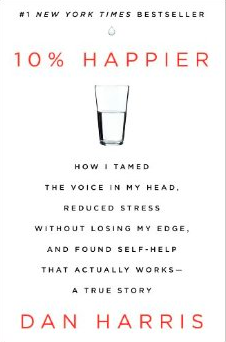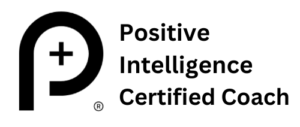 Are you sick of hearing people talk about the benefits of meditating when you know you’re not “that type” of person (a Birkenstock-wearing vegetarian)?
Are you sick of hearing people talk about the benefits of meditating when you know you’re not “that type” of person (a Birkenstock-wearing vegetarian)?
Or maybe you’re intrigued by the scientific studies reported in the news showing that mindfulness is good for you, but you know that your mind is incapable of stillness?
Or perhaps you feel you might be able to learn to meditate if only you didn’t have to earn a paycheck or raise a family.
Dan Harris, ABC news correspondent and anchor of Nightline and the weekend edition of Good Morning America, had also been a skeptic. That is, until a nationally televised panic attack sparked a process of self-discovery that would eventually dump him on a meditation cushion.
Harris tells his story in 10% Happier: How I Tamed the Voice in My Head, Reduced Stress Without Losing My Edge, and Found Self-Help that Actually Works — A True Story (New York: Harper Collins, 2014, 256 pages).
Whereas the rest of us are limited to books, webinars, and a seat in the audience on our quest for enlightenment, Harris had direct access to the top spiritual and mindfulness teachers in the country.
Seeking out these people hadn’t been his idea. Peter Jennings had assigned Harris to the religion beat at ABC news, which was interesting to the young correspondent only in the context of the religious right’s involvement in politics. The synchronistic assignment turned out to be transformative.
A friend of mine told me about 10% Happier several months ago. The similarities between Harris’s path and my own were uncanny:
- Our initial reactions to Eckhart Tolle’s A New Earth: Awakening to Your Life’s Purpose mirrored one another — first incredulous, then recognizing that ego had, indeed, been wreaking havoc on our thinking processes.
- Meeting the Dalai Lama and, being completely won over by the man’s delightful presence, thinking, “I’ll have what he’s having.” (Harris got to actually interview His Holiness while I only sat in a fourth row seat at a lecture, but that’s OK.)
- And eventually learning through our own bumbling efforts that meditation and other mindfulness practices are tools that any of us–regardless of spiritual orientation–can use to achieve a calmer, happier, more fulfilling life.
I told my friend, “I’d better not read that book until I’m finished writing my own. I don’t want to plagiarize.”
So with my own manuscript now safely in the hands of the copy editor, I finally checked out Harris’s book.
The best example of the similarities in our stories (left-brained, driven people stumbling unexpectedly into mindfulness) is that both of us used the same analogy to describe the moment we recognized the ego voice in our heads, and, more importantly, that it was not to be trusted:
“It was a revelation: the voice in my head, which I’d always taken so seriously, suddenly lost much of its authority. It was like peering behind the curtain and seeing that the Wizard of Oz was a frightened, frail old man.” ~ Dan Harris, 10 Percent Happier, 2014
“The image that immediately came to mind was the scene in The Wizard of Oz when Dorothy and team are cowering in front of the huge and terrifying wizard head, presenting the burned broom of the Wicked Witch of the West. Toto runs off and pulls back a curtain to reveal the true ‘wizard’, a very unimposing man in need of an eyebrow trim.” ~ Martha Brettschneider, Pay No Attention to That Man Behind the Curtain!, August 11, 2012
Yes, Harris had a better editor for his book than I had for my blog post, but there’s no getting around the fact that our before and after shots were quite similar (my quote was published before his, in case you hadn’t noticed).
Ten More Awesome Quotes from 10% Happier
1) “The repeated attempt to bring the compulsive thought machine to heel was like holding a live fish in your hands. Wrestling your mind to the ground, repeatedly hauling your attention back to the breath in the face of the inner onslaught required genuine grit. This was a badass endeavor.”
2) “Mindfulness represented an alternative to living reactively.”
3) “What mindfulness does is create some space in your head so you can, as the Buddhists say, ‘respond’ rather than simply ‘react’. In the Buddhist view, you can’t control what comes up in your head; it all arises out of a mysterious void. We spend a lot of time judging ourselves harshly for feelings that we had no role in summoning. The only thing you can controls is how you handle it.”
4) “How do you learn a sport? You do drills. A language? Conjugate endless verbs. A musical instrument? Scales. All the misery of repetition, the horror of sitting here in this hall with these zombies suddenly seems totally worth it.”
5) “When obsessing on a thought or worrying ask yourself, ‘Is this useful?'”
6) “When I got tense about work, I would watch how it was manifesting in my body — the buzzing in my chest, my earlobes getting hot, the heaviness in my head. Investigating and labeling my feelings really did put them in perspective; they seemed much less solid.”
7) “Mindfulness, I had come to believe, could, in fact, change the world.”
8) “If you spend a half hour on the cushion every day contending with your own ego, it’s hard not to be more tolerant of others.”
9) “If you don’t waste your energy on variables you cannot influence, you can focus much more effectively on those you can. When you are wisely ambitious, you do everything you can to succeed, but you are not attached to the outcome — so that if you fail, you will be maximally resilient, able to get up, dust yourself off, and get back in the fray. That, to use a loaded term, is enlightened self-interest.”
10) “Mindfulness, I now realized, was the best and potentially most impactful story I’d ever covered. … I thought that if I could find a way to make it more broadly appealing, that would be a real service.”
My sentiments exactly.
Buy the book, people. Even if you don’t end up meditating, the stories Harris shares about ABC news personalities and his self-deprecating humor make it worth the read. His writing is engaging, informative, and funny as hell. My favorite chapter is titled “The Self-Interested Case for Not Being a Dick.”
Have you perhaps read 10% Happier already? If so, what did you think? Do you have other favorite books on mindfulness that you could share? Slap them down in the comments!
If you enjoyed today’s entry and are not yet a subscriber, sign up in the right sidebar for free updates. (I promise to never share your information.) Social media likes and shares are always appreciated as well!


